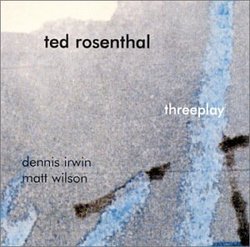A Breath of Fresh Air
Stephen A. Smith | Boston, MA | 05/20/2005
(5 out of 5 stars)
"This is an instance where I'm biased before I even receive the CD. I love Ted Rosenthal. I first heard him about ten years ago when Eric Jackson played a few cuts from Rosenthal's Maybeck recital on 89.7 FM WGBH in Boston. This was during the major labels' "young lions" phase, when it seemed all the spotlight was on Roy Hargrove, Nicholas Payton, Christian McBride, etc. -- and their crop of pianists, from Stephen Scott and Anthony Wonsey to Geoff Keezer and Cyrus Chestnut. Everybody knew bebop inside and out, but no one had gone back any further.
Then along comes Ted Rosenthal. His Maybeck recital was the 38th in Concord's series, and I had heard most of the others. The first thing that struck me was the way he used the sustain pedal. I've heard organists who aren't as capable with the pedal as Rosenthal. For most pianists, it's an afterthought, or an effect. Rosenthal uses the pedal as deftly as the keys above it.
More importantly, the man knows his history. His playing contains elements of everything from Bach to boogie to bebop, and beyond. And he assimilated all of it. The result, instead of a pianist who sounds like Scott Joplin one minute and Bud Powell the next, is a truly original voice. He did all the homework, and then he took the next step. He did something new.
As you're listening to "Threeplay," consider a comparison. Bill Evans is credited with transforming the piano trio into an equal partnership, where the bass and drums were no longer relegated behind the piano. Something similar happens here. Listen to almost any other recent piano trio before playing this CD, and you'll notice a difference. Rosenthal controls the instrument differently. He doesn't dominate the landscape. On most CDs, there's hardly a moment when you can't hear the piano. Rosenthal, in contrast, leaves plenty of space for Irwin and Wilson -- and he does it without necessarily playing less, which makes it more remarkable.
Now, Bill Evans hit jazz piano like a meteor. I'm not arguing that Rosenthal belongs on that tier. But I do think history will recognize that the best jazz of our time is coming from independent labels -- like this release on Playscape, or Rosenthal's duet with the legendary Bob Brookmeyer on Planet Arts. Rosenthal is a unique musician, head and shoulders above most of his peers. If you don't have him represented in your collection, you're missing someone special."


 Track Listings (9) - Disc #1
Track Listings (9) - Disc #1